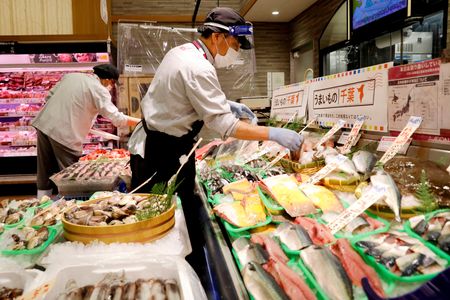(This Aug 4 story corrects milestone to February from January in paragraph 2)
By Daniel Leussink
TOKYO (Reuters) – Japan’s households increased spending for the first time in four months in June, as demand for travel services rose in a positive sign for broader recovery prospects.
Spending jumped 3.5% in June from a year earlier, government data showed on Friday, posting its first year-on-year rise since February as households opened their purse strings for overnight stays, package tours and outdoor goods.
The data, which was stronger than the median estimate for a 1.5% rise in a Reuters poll, showed people spent less on fish and vegetables, while also spending more on transportation.
While the rise was larger than expected, it was unlikely to dispel worries that Japan’s recovery will lag those seen in other major economies such as the United States, especially after COVID-19 infections saw a record surge in recent weeks.
There will be cases where people give up travelling given the pandemic’s rapid spread, even without new restrictions in place against it, said Atsushi Takeda, chief economist at Itochu Economic Research Institute.
“The momentum driving the recovery in travel will slow for the moment,” Takeda added.
Spending on overnight stays in June topped levels seen before the pandemic three years earlier by 4.5%, data showed.
Separate data on Friday showed Japan’s real wages extended declines for a third straight month in June, as consumer prices rose faster than nominal wages, which saw their strongest growth in four years, in a worrying sign for households’ purchasing power.
“Wage growth remains subdued once we allow for the increases in working hours, and will not be enough to prompt the Bank of Japan to tighten monetary policy,” said Darren Tay, Japan economist at Capital Economics.
A private sector survey earlier this week showed growth in services sector activity stalling in July as rising inflation and uncertainty about the global economy hurt demand.
Some analysts have started to warn that Japan’s economic recovery may slow in the current quarter following an expected expansion in April-June due to a modest rebound in consumer demand after the government lifted COVID-19 curbs.
Friday’s data showed spending also rose from the previous month, gaining 1.5% on a seasonally-adjusted basis.
That gain, which was stronger than a forecast 0.2% rise, marked a rebound from a sharp 1.9% decline in the previous month.
(Reporting by Daniel Leussink; Editing by Sam Holmes)





